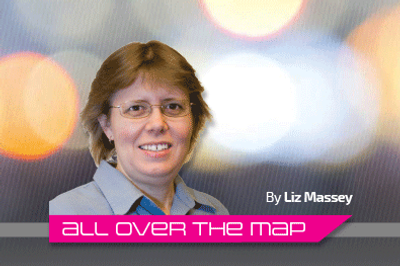By Liz Massey, August 2015 Issue.
You’ll have to forgive me if school was a drag for you, but I come from a family full of teachers, and I have a bit of an office/school supply fetish, so when summer break draws to a close, I always get pretty excited about the idea of returning to the classroom.
In the generation or two before my own, teaching was definitely the family profession. Both my grandmothers had teaching degrees; my mother’s mother obtained her normal school certificate so early in the 20th century that her first teaching gig involved riding horseback to teach at a one-room schoolhouse. My great-aunt taught high school home economics for 40 years. My parents met at Kansas State Teachers College (now Emporia State) and lived out the early years of their marriage teaching in an assortment of small towns on the prairie. Even my father’s father, too old during World War II to enlist in the military, taught a few classes “for the duration.”
The impact of this family legacy upon me has been profound. My mother leveraged her kindergarten teacher training to get me ready for school when I was little, playing PBS nonstop and engaging me in craft projects and pre-reading activities. My father, who worked as a music teacher, made sure I had a box full of hand percussion to play with and that we sang together as a family often.
The most valuable thing I gained from my family’s love of learning is that the “school of life” is always in session. Learning isn’t something that stops when we reach 18 or 22 – every day of our lives presents us with opportunities to get better at tasks through patience and practice.
LGBT people, long banned from teaching because we were feared to be a “bad influence” upon impressionable youngsters, should take an active interest in promoting lifelong learning. Most of the arguments against our tribe are rooted in ignorance. Nurturing a society of citizens who can think critically and are not bamboozled by political or advertising mumbo-jumbo is in our own self-interest. Some ways we can support learning as a community include:
Support Public Education
Your tax dollars underwrite it, and there’s more impetus to promote equal opportunity and fair treatment in a public setting than at a private institution.
Support LGBT Students
Organizations such as the Gay-Straight Alliances in schools across the country and the Gay, Lesbian and Straight Education Network work to make life better for current queer students. They can always use more helping hands or a few dollars from your wallet.
Help Queer Students Finish Their Schooling
For LGBT students who are rejected by their family, having the money and logistical support to complete high school or college can make the difference between barely surviving and thriving. One n ten’s Q High helps kids get the all-important high school diploma, and Arizona State University has a scholarship fund for LGBT students.
Cultivate a taste for informal learning
This term, coined by training expert Jay Cross, reminds us that most of what we learn in life – from how to walk as a baby to the best way to clear a copier jam at work – happens outside of a classroom. Realizing this can broaden our frame of reference for acquiring new skills. Instead of only seeking new educational experiences by signing up for a class, we can also seek to learn more through conversations with others, online research, reading, and practice.
Make an effort to pass along what we know
Whether it’s through mentoring younger LGBT folks, providing service learning experiences at a nonprofit, forming a hobby-based Meetup, or summing up our experiences by writing a memoir or recording an oral history, giving back by sharing what’s worked for us can be a satisfying way to affirm that our lives have mattered.
Instead of looking at education as something I’m seeking to complete, or have completed, I’ve consciously chosen to see life as an ongoing open-book test. I’m in agreement with the philosopher Jiddu Krishnamurti, who said, “There is no end to education. It is not that you read a book, pass an examination, and finish with education. The whole of life, from the moment you are born to the moment you die, is a process of learning.”
